
Let’s start by asking yourself some questions:
- Do I love maths?
- Would I enjoy learning programs to communicate with computers?
- Am I creative and love solving challenging problems?
- Can I think logically and persistently?
If your answers are yes to all the questions above, taking up a Computer Science course would be ideal for you! Following would describe what Computer Science is all about and our recommendation for Universities to study Computer Science in Australia.
What is Computer Science?
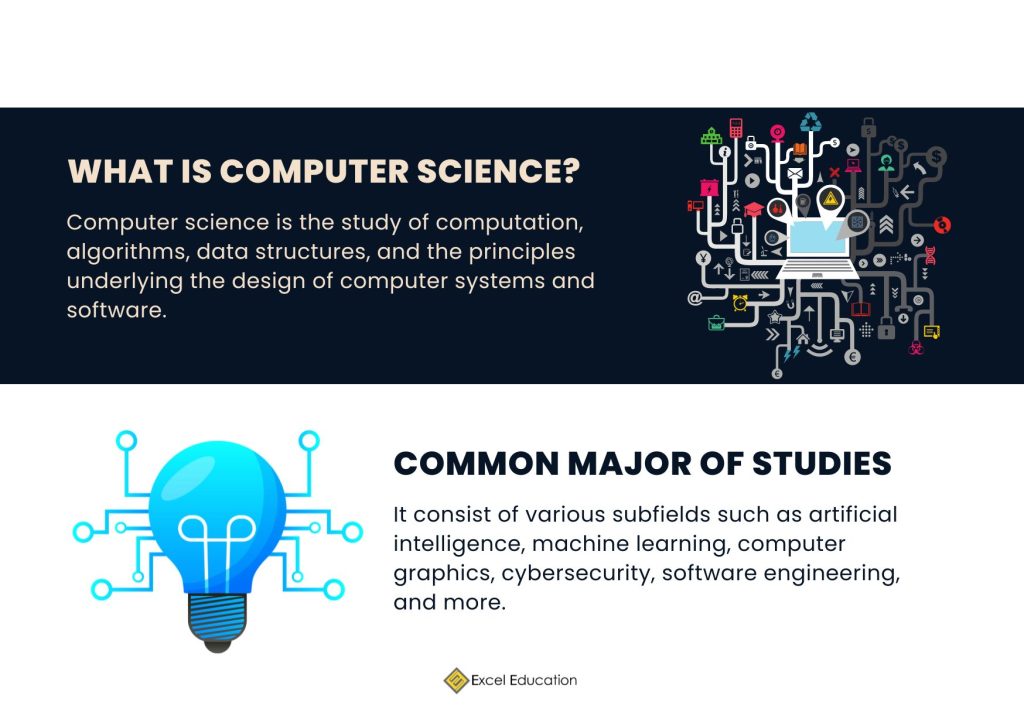
Computer science is the study of principles and, through application, involves mathematics, science, engineering algorithms, software engineering, hardware engineering, and artificial intelligence, along with exposure to languages like Java, Python, and C++. You’ll learn about the major technologies and innovations, allowing access to very deep knowledge of the next major technologies.
They include some of the very newest and greatest developments that majors in computer science can look forward to. Being fast paced and sharp will help you to solve complex problems on a daily basis. If you are the type who likes to solve complex problems using rational analysis, then this programme is for you.
Key skills needed to study Computer Science
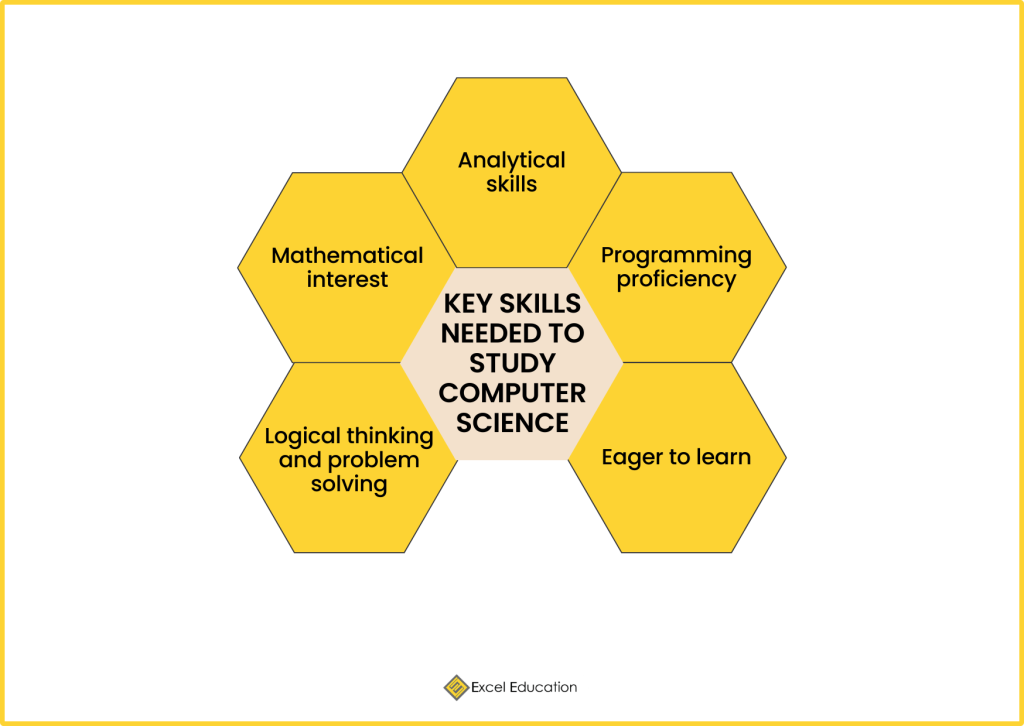
1. Analytical skills
Analytical skills are important in computer science since they form a base for solving problems in a very systematic manner. This greatly attributes to the skill of debugging and logical reasoning since such skills develop an ability to carry out error-free code.
2. Mathematical interest
Having a solid grasp of maths, particularly in subjects like algebra and calculus, is super important. These mathematical building blocks form the foundation of computer science stuff like creating cool programmes, solving problems, analysing data, and all sorts of other interesting things.
3. Programming proficiency
Learning software development languages such as Python, Java or C++ is crucial for this computer science. It is not about typing line after line as you also need to learn the syntax language, debug, and think step by step through a problem logically.
4. Logical thinking and problem solving
This skill involves the method to approach problems methodically, think critically, and work out efficient solutions. It is about seeing the bigger picture while also paying attention to the details.
5. Eager to learn
Computer science is an ever-evolving field, and the languages and technologies change frequently. You should always approach the subject with a desire to learn, as you will constantly be required to adapt to new developments — but such is the nature of the technology industry.
Career pathways after studying a Computer Science Degree
To work in the field of Computer Science in Australia, you are usually expected to have completed an undergraduate qualification related to the field along with hands-on experience building software applications outside of education settings (ex: internships, hobbies or freelancing).
Here are different career options for Computer Science graduates:
- Computer Programmer
- Data Scientist
- Software tester
- Web developer
- System analyst
- Business analyst
- Database administrator
- Software architect
- System engineer
- Cyber security analyst
Average annual salary for Programmers in Australia can earn ranges from AU$ 80,000 to AU$ 100,000
*Average annual salary differs between states in Australia.
Graduates will be eligible to apply to join the Australian Computer Society (ACS), and the program has been designed to specifically meet level 1 accreditation. Students and graduates can also join the Association for Computing Machinery (ACM) and the Institute of Electrical and Electronics Engineers (IEEE).
General entry requirements for universities to study Computer Science in Australia
Academic Entry
Academic entry | Minimum Score |
STPM | Aggregate score of 6 |
Matriculation | CGPA of 2.75 |
A-Levels | Aggregate score of 6 |
UEC | CGPA of 2.20 |
IB Diploma | 26 |
Australian Matriculation (ATAR) | 70 |
Canadian Pre-University (CPU) | 60 |
Note: Universities may have different requirements. To learn more, get in touch with us!
English Language Entry Requirements
Entry Level | Minimum Score |
IELTS | 6.5 |
TOEFL | 79 |
Pearson Test of English (PTE) | 56 |
Note: Universities may have different English language requirements. To learn more, get in touch with us!
Top 5 Universities to study Computer Science in Australia
When considering universities to study Computer Science in Australia, it’s important to prioritise institutions with strong industry connections and a curriculum that emphasises practical skills development.
Following are the recommendation universities to study Computer Science in Australia that you can consider:
1. Australian National University (ANU)
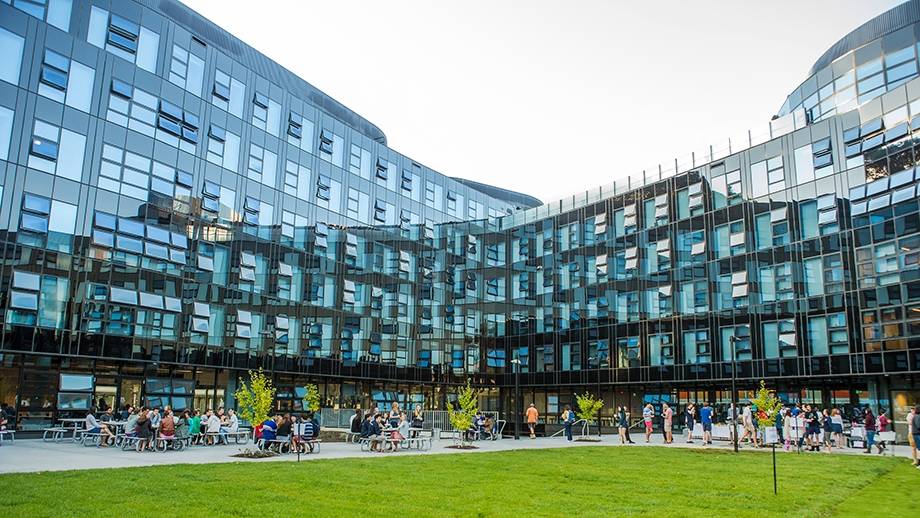
Australian National University (ANU) is one of the pioneering research universities, based in Canberra, Australia and part of Group of Eight (Go8). Established in 1946, the university has an outstanding international reputation for its research, academia, and innovation. The faculty at ANU consist of field leaders with highly emphasis placed on research.
Students will study the fundamental principles and methods for the physical and logical design of computers, computer systems, and networks, and learn how to translate computational processes and procedural solutions into working software systems. This theory explores topics such as data structures, algorithms, and programming languages as well as complex systems, computational theory, computer networks, software engineering, human-centric computing, computer graphics, information systems, and bioinformatics.
Programme Offered | Bachelor of Science Major: Computer Science |
Duration | 3 years |
Intake | February, July |
Indicative Fee (2024) | International Students: AU$ 152,280 |
2. University of Technology Sydney (UTS)

University of Technology Sydney (UTS) is the most popular leading Australian university located in Sydney, New South Wales. Incorporated in 1988, UTS has soared to the height of prominence for innovative, creative quality education, strong links and partnerships with industry, and research excellence.
Students will have the opportunity to specialise in various majors, such as Artificial Intelligence and Data Analytics, Cybersecurity and Privacy, Networking and Cybersecurity, and more. UTS emphasises hands-on learning and practical experience, with opportunities for students to work on real-world projects and collaborate with industry partners.
Programme Offered | Duration | Intake | Indicative Fees (2024) |
Bachelor of Computing Science | 3 years | February, July | International Students: AU$ 151,200 |
Bachelor of Computing Science (Honours) | 4 years | February, July | International Students: AU$ 201,600 |
3. Queensland University of Technology (QUT)
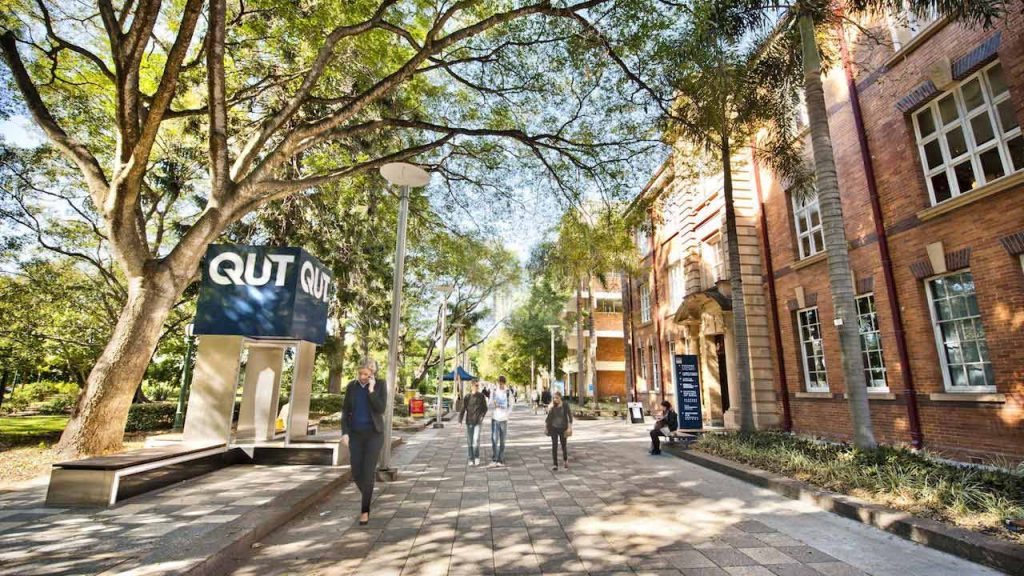
Queensland University of Technology (QUT) is a well known Australian university located in Brisbane, Queensland. Established in 1989, the University has quickly risen up the ranks thanks to its unique approach to education, strong industry links and commitment to research excellence.
Students under the Computer Science Major will have an opportunity to develop skills in application design and development, discrete structures, software development, and networks. You will have practical hands-on experiences during your course with additional opportunities for further specialisations through second major or minors.
Programme Offered | Bachelor of Information Technology (Computer Science) |
Duration | 3 years |
Intake | February, July |
Indicative Fee (2024) | International Students: AU$ 116,700 |
4. Curtin University
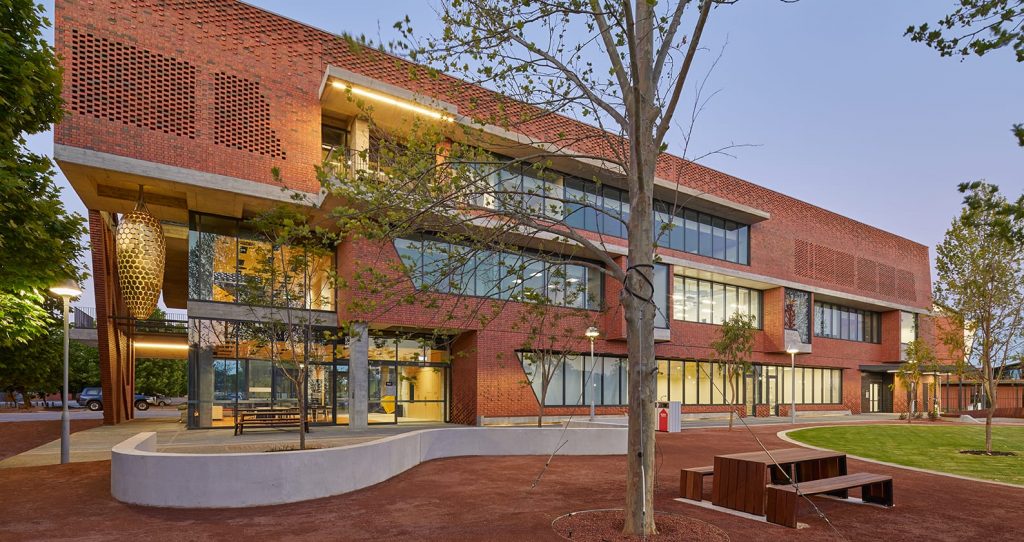
Curtin University is a renowned Australian university, named after John Curtin, and is located in Perth, Western Australia. Established in 1966, Curtin has continued to grow and opened campuses in Singapore, Malaysia, Dubai, and Mauritius; also, it has connections with 90 exchange universities in 20 countries.
This programme will provide students with high level knowledge of computer systems and processes involved in software development and maintenance. Students will be exposed to Linux from fundamentals until progressing topics. Curtin works closely with industry and selected students may have the opportunity to undertake their final-year project in collaboration with an industry partner.
Programme Offered | Bachelor of Computing Major: Computer Science |
Duration | 3 years |
Intake | February, July |
Indicative Fee (2024) | International Students: AU$ 103,569 |
5. Charles Darwin University (CDU)
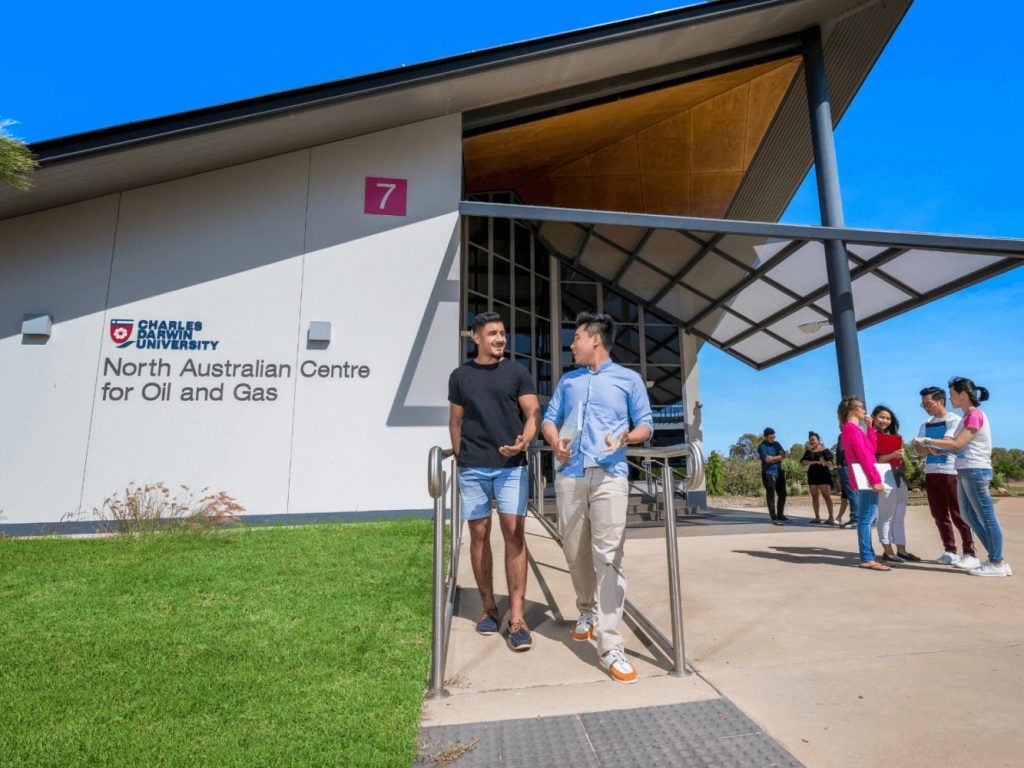
This is Charles Darwin University (CDU), an Australian public university that was established in 2003, and is equipped with a curriculum specialising in providing students with the qualifications and skills needed to address the special challenges and opportunities of the Northern Territory and tropical regions.
CDU’s Bachelor of Computer Science is applied and hands-on, with students working on real-life projects with industry partners. In doing so, they develop the problem-solving skills and the essential knowledge to perform effectively in a workforce setting. Students may be considered a suitable candidate for progression to the Bachelor of Science (Honours), or if they wish to further progress their studies, they may progress to the Master of Information Technology.
Programme Offered | Bachelor of Computer Science |
Duration | 3 years |
Intake | March, July |
Indicative Fee (2024) | International Students: AU$ 95,064 |
For more information regarding the university, programmes offered, entry requirements and fees, contact Excel Education.
Recommended Articles to Read
About The Author

Brenda
Brenda enjoys action, thriller, psychological, and comedy movies as well as TV shows very much. Oftentimes, she really enjoy learning new stuff.

